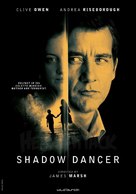Reviews provided by RottenTomatoes
Stephen Holden, New York Times: "Shadow Dancer" is ominously subdued and grimly taciturn. The dialogue is minimal. Only what has to be said is said, and the tone of most of it is one of quiet urgency. Read more
Rex Reed, New York Observer: The movie eventually wafts into a detective story, which would be doubly effective if only we could hack our way through the thickly coated Irish brogues that render so much of the dialogue incomprehensible. Read more
Ignatiy Vishnevetsky, AV Club: Director James Marsh, best known for his documentaries Man On Wire and Project Nim, crafts an atmosphere of tenuous dread. Read more
Bill Goodykoontz, Arizona Republic: These are characters for whom true belief in a cause has probably become impossible; they know how much that costs. Marsh does a compelling job of illustrating that for the rest of us. Read more
Ty Burr, Boston Globe: A tautly minimalist, occasionally generic study of betrayal and family ties. Read more
J. R. Jones, Chicago Reader: This British thriller by James Marsh is a little too neatly scripted and tightly edited for my taste, but there are galvanizing performances from Andrea Riseborough... and Clive Owen. Read more
William Goss, Film.com: Riseborough gives a tremendously vulnerable and resolute turn as a protector at home and avenger abroad forced to reconsider the extent to which she is capable of avoiding the crossfire on all sides. Read more
David Rooney, Hollywood Reporter: James Marsh's gripping thriller set in Northern Ireland demands patience and concentration of its audience, but the impeccably crafted film is well worth the effort. Read more
Robert Abele, Los Angeles Times: The character mechanics ... leave the viewer always feeling a step ahead of the story and its too-late-to-excite twists. Read more
Stephen Whitty, Newark Star-Ledger: The movie runs into the same problem all stories like this do: Generally, audiences don't like snitches. Read more
Ian Buckwalter, NPR: Shadow Dancer feels like a thriller, but Marsh is wisely more interested in the tension than in the release. What thrills exist here are carefully tempered by the considered pacing. Read more
Elizabeth Weitzman, New York Daily News: Riseborough once again transforms herself dramatically, expanding her role as best she can. But neither the hesitant script - adapted by Tom Bradby from his own novel - nor the sluggish tempo give her enough support. Read more
Sara Stewart, New York Post: The proceedings move so quietly and thoughtfully as to be occasionally somnolent, though they're punctuated with spasms of the violence that marked the Troubles. Read more
Steven Rea, Philadelphia Inquirer: [Riseborough's] work is indrawn and riveting. It's hard to read the look in her eye, but we never stop trying. Read more
Walter V. Addiego, San Francisco Chronicle: The film relies on terse dialogue and boggy colors to create an atmosphere dense with anxiety -- all well handled by director James March. Read more
Dana Stevens, Slate: Riseborough's ever-mobile face is a study as Collette cycles from hopelessness to panic to mama-bear rage. Read more
Colin Covert, Minneapolis Star Tribune: A respectable political/psychological suspenser, but not a wildly entertaining or enjoyable one. Read more
Cath Clarke, Time Out: While it's hard to grumble about such a smart, intelligent drama after a summer of big bangs, its slow pace at times feels sluggish. Read more
David Fear, Time Out: There's slow-burning, and then there's simply slow; the difference between the two has never been so apparent. Read more
Justin Chang, Variety: The occasional flareup of violence notwithstanding, it's Riseborough's performance that provides the primary source of suspense. Read more
Nick Schager, Village Voice: The film rests on the desperate chemistry of a paunchy, weathered Owen and a tense, quietly ferocious Riseborough. Read more

